Text
The Two Sides of “The Two Sides of Singapore, As Seen By A Food Delivery Rider”, As Seen By A Food Delivery Rider
https://medium.com/@bdgthinksShort pre-amble: Just as how the original Rice article is just the opinion of one writer, what I’m writing below is likewise, just the opinion of mine alone. Also, my opinions are based on my experience working with Deliveroo while Yusuf worked for Grab Food so there may be some differences between the pay structure, zone distances and other company-specific policies.
I was clicking past Instagram stories yesterday afternoon, about to take a nap, when I saw a friend share this recently posted Rice Media article. Part photo journal, part commentary on the gig economy, Singapore’s class divide, and how income inequality is growing more apparent as we adapt to the ever-evolving Covid-19 situation? Sign me the hell up.

All images courtesy of Ricemedia.co, Yusuf Abdol Hamid, or myself
20 minutes, a few raised eyebrows, and many heated texts later – I reluctantly abandoned my plans to nap because I read some many things in this article (which I highly recommend you read first before reading on!) that I disagree with profoundly.
Before I start, I want to offer my appreciation to Yusuf (the narrator), Boon Ping (the editor/author), and Rice Media for publishing this piece that will help many understand the oft-overlooked issue of social/income inequality in an engaging and accessible manner. My misgivings towards some of Yusuf’s opinions notwithstanding, the general sentiment towards this article is extremely positive and has done what I believe every great article should do, provoke thought and inspire critical thinking towards the status quo!



A smattering of positive feedback to the original article
What I appreciated most about the article is encapsulated by joce_zhang’s comment, that it’s an important reminder to be kinder to people – regardless.
However, I couldn’t help but find it slightly troubling that Yusuf and Boon Ping (the editor) seemed to have oversimplified these issues and reduced the stakeholders to caricatures: the rich as the Monopoly Man; and the tireless ‘seen by many as a dead-end job’ delivery couriers as a Dickensian orphan, counting pennies and agonizing over whether they ‘deserve’ a Zinger.
I worry that one unintended consequence of this article is that some ways social inequality is highlighted may lead to reinforcement of the divide rather than dissolution.
During my Summer holidays in 2018, I became attracted to the idea of working part-time as a food courier cyclist as in my mind I saw it as being paid to just cycle and listen to podcasts. Since then, I’ve been an on-off Deliveroo cyclist during the shorter holidays or whenever I needed a little bit of extra pocket money.
In past the two years, I’ve earned exactly $4081.63 from making deliveries (inclusive of bonuses) and dividing it by a conservative $15/h rate, I’ve worked for around 272 hours or about 700 deliveries. split about 60/40 between private properties and HDB flats.
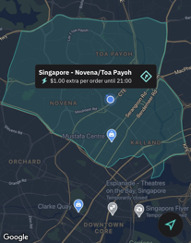
And I guess it’s also partly because of my different experience working in food couriering the past two years that made me feel so much discontent while reading Yusuf’s article. In these 400-odd deliveries to private residences (or heck, in any of my deliveries), I don’t recall having once been treated unnecessarily rudely, aggressively or dismissively by any of the stakeholders I interact with in the job – restaurant servers and managers, condo security management and customers alike.
What I have experienced actually are customers that have tipped me for my efforts - especially ones who live in fairly inaccessible areas, and (during this circuit breaker period) offered me a snack or a cold drink to drop off their deliveries; security guards who ask me how my day was and if I’ve had my lunch or dinner; and restaurant staff who invite me to have a seat in the restaurant while I wait for my order.
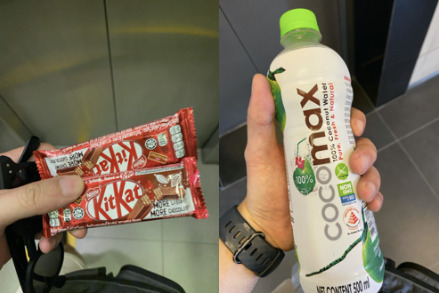
Some treats from kind customers
Even when I had made a mess of the customer’s order from their order roiling around during a bumpy 15-minute bike ride (entirely my fault of course!), I’ve never heard anything more than an entirely deserved ‘tsk’ at the disappointment of having half of their pho soup ending up in the plastic bag instead of the bowl – and even then these tsk’s are far and few between!
And it is (again, solely from my own personal experience) where I felt that Yusuf could have been cherry-picking the worst examples from his own experience to make a point. While service industry personnel are no doubt severely underappreciated and that should be improved as a whole, I feel that such blatant incidents are the exception rather than the rule.
My point is: the world isn’t binary. Heck, even up to a year ago I was still echoing Yusuf’s entire argument and ranting rather colorfully about the injustice and discrimination of it all. Who are YOU to tell me which lift I can and cannot use?
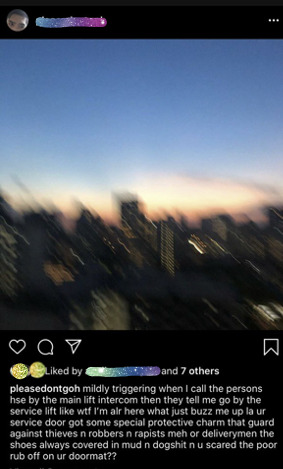
In the pursuit of delivering a commentary on some really important social issues, I feel that it fell short by over-emphasizing the ludicrousness of the elite and failing to consider the many other factors that contributes to this problem.

For one, I thought that the annoyance projected to security guards seeing themselves as ‘a barrier between the riff-raff and their diamond-encrusted residents’ was a bit uncalled for – painting a picture of the fearsome guard – in employ of the up-in-the-air bourgeois hiding in their ivory tower, assailing an innocent courier who had the audacity to think that he had the right to take the same elevator as the residents?
But then… when we consider that most lift lobbies are a good distance from the security guard posts where the guards are stationed, it doesn’t seem so unreasonable for a guard to have to raise his voice to get his point across, right?
Being fortunate enough to live in a condo myself, I’ve sometimes felt unease in the duality that security guards experience every single day: faithful bastions in keeping residents safe, spending their days patrolling the lush, landscaped gardens and expansive feature infinity pools, but never once stepping foot into the houses they loyally guard.
And at the end of the day, clocking out to return home to an environment I assume is much less luxurious.
So why then, do Yusuf and Boon Ping deign to foster an us vs them divide, arbitrarily placing one occupation on one side of the line and another on the opposite?

How about the incredulousness towards the guy who orders a stupid $11 Dal.komm latte every day, or the Grange Road resident who only orders a single scoop of Haagen-Dazs ice cream?
Like I said, caricatures that highlight and reinforce the rich-poor divide.
Cherry-picking prevents the reader from seeing the single cups of coffee that I’ve delivered from Common Man Coffee Roasters to Tenteram Peak, the eight egg tarts from Whampoa Hawker Center to Toa Payoh. Or my dad, who lives a one-minute walk from the hawker center but still chooses to order through Grabfood because he paid for a subscription service that offers 50 free deliveries for just $10?
All these customers lived in HDB units.
As a courier, there’s nothing I appreciate more than collecting an order to find out I’m being paid $5 to cycle one block away, or reaching the restaurant to find out that a customer only ordered an easy-to-transport wrap instead of say, twelve packets of chicken rice – I’m getting paid the same amount anyway.
So yes, they’re paying our salary, so thank you.
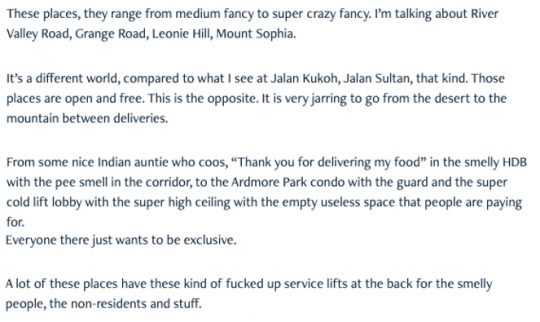
Juxtaposition is also good and all for making a point, but is it truly accurate and representative?
The word exclusive is used a lot by Yusuf - but are those who live in a smelly HDB with the pee smell in the corridor exclusively nice, and the expat who lives in the Ardmore Park condo with the super high ceiling exclusively mean? Is it wrong to live (or aspire to live) in an exclusive private property? These are questions to be stimulated, not answers to be given.
There’s so much to pick apart, but my goal isn’t to say: I’m Right, You’re Wrong, it’s just that say that There Are Two Sides to Everything.
A brief aside on ‘fulfillment’
While I love my part-time job – paying me upwards of $20 an hour to keep fit and listen to podcasts, I’m entirely cognizant that while I’m privileged that it’s a side-hustle, a side-gig, a part-time job to me; it’s also a livelihood to tens of thousands of hardworking people out there.
Where I could turn off the app and head home when I decided I’ve earned enough in the week to eat at a new restaurant I’ve been eyeing or if it was too hot in the afternoon, most other people working my job can’t – if not, the lights may not turn on the next day.
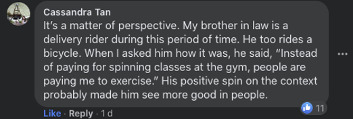
In a comment to an earlier draft of this piece, a friend shared that it’s a privilege to be able to separate your social identities. I think it’s also a privilege to have the choice of perspective. We exercise when we’re healthy, as a hobby, or a passion. Deliverymen don’t see it that way. There is no ‘good to do’, there is only ‘must do’.
At the end of the day when the world starts to recover from Covid-19, you’re going to start getting photo and videography gigs and transition back to the white-collar world.
As for the security guard and domestic helper at Ardmore Park, the server at the Grange Road Haagen-Dazs, and the tens of thousands of for-hire drivers and delivery couriers? There’s no ‘back to normal’ – this is their normal.
In a discussion post on Yusuf’s article, a redditor referenced Maslow’s hierarchy of needs:

In the blue-collar normal, where every day is a struggle to meet the needs of financial safety and security, maybe fulfilment isn’t really an aspiration for most. In an article calling for empathy, I feel the quality slightly lacking in my reading.
A few months back I began my education into inequality in Singapore with Teo You Yenn’s seminal This Is What Inequality Looks Like. In it, the title of one of her essays especially stood out to me: Dignity Is Like Clean Air. She describes, like Yusuf does, that many blue-collar workers in the service industry always feel invisible, that people don’t respect them, that it makes them feel small. I’d like to add on to** Dignity Is Like Clean Air** with the caveat: Segregation Is Not Necessarily Dirty.
Going back to the ‘fucked up service lifts at the back for the smelly people, the non-residents and stuff’, how about we just call a spade a spade?
In restaurants, servers and chefs who have their meals there usually sit at tables near the kitchen (or even in the kitchen itself).
In airplanes, consumers have the choice to pay a much higher premium for more leg room and a more gourmet selection of food. In fancy hotels, bellboys and concierge staff have to wear stiff suits – there’s usually a dress code for guests to enter certain areas.
So, is it really that unfair, for someone who’s had the means to pay for the privilege of living in luxury, to not really want to share a lift with someone who might smell unpleasant from having spent hours cycling under the hot sun?
The service lift provides the same functionality – no one’s saying that couriers are ‘lesser people’, we’re not being asked to walk up the stairs while the ‘masters’ take the magic moving box. It wasn’t created to separate the ‘undesirables’ from the ‘desirables’ like a pre-Rosa Parks bus, and it’ll be unhealthy to think of it as such – even worse to let it fester.
To package my views into a neatly categorized box – When I’m Brandon the Deliveryman, it’s perfectly fine for a guard to request for me to take the service lift, but when I’m Brandon the Guest attending a dinner party at the same condo, no one is stopping me from taking the resident lift right?
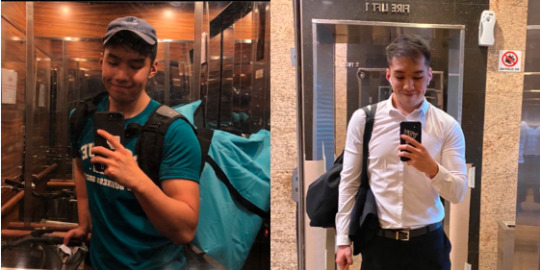
Different day, Different fit, Same me
I still think that it’s incredibly fucked up that some employers make their helpers take a separate lift though.
But in delivering the core message – is it more helpful to frame your reflection as ‘why do some people treat their subordinates with such contempt and how can we as society hope to change it’, or to just resent the fact that ‘rich people like that la’ – and laugh and pretend we’re friends.
I guess what I’m most frustrated with about the article is that it had the potential to be so much more. It occasionally flirts with the possibility of going deeper into one issue or the other but ultimately ends up being a reflection of one privileged dude’s brief foray into an industry that many of us often take for granted.
And because there are so many issues at play, people often fall into the trap of distilling extremely complicated issues into dangerous sweeping statements, which eventually does very little for the problem in question.
Another frustration I often have towards the discourse towards social issues is that they often fail to carry a call-to-action. Okay, I’ve checked my privilege, I’ve understood that my successes in life is partly a byproduct of the wealthy family I was fortunate to being born into – now what?
A good rule of thumb that I’ve been trying to implement into my life recently is to think about the net positive or net negative an action has onto society. And hence:
To the fortunate: While it is important to understand your privilege and not take things for granted, you also don’t have to be ashamed of it. Every dollar you spend goes into the economy and is earned by someone else. So, what can you do to influence a net positive?
Be kind to everyone, be kind to everyone, be kind to everyone.
If you can, have the moral courage to call out undesirable behavior – especially if it’s someone close to you. But if you can’t – it’s okay too. Start with yourself. The world could do with less ‘you should do more’ and more ‘thank you for what you did’.
This is not exclusive to tipping service staff or offering couriers a cold drink (although it is always really welcome!). Offer a kind word to anyone you interact with. Ask the office or school janitor if they’ve had their meal yet, wish your security guard a good morning/good evening when you pass them by, clear your tray when you’re at a fast food restaurant and smile and thank the servers if you pass them by.
I promise you - these little acts of kindness will go a much longer way received than it takes you to give them.
To our everyday heroes: Your intrinsic self worth is by no means defined by how an asshole treats you. You are so, so, so much more important.
You are somebody, you are somebody, you are somebody.
In this essay, my intention is to extend the net positive that Yusuf and Rice has already generated while minimizing the net negatives it may unintentionally create by framing the issue as ‘us vs them’.
I hope that it will be seen as an addendum to Yusuf’s original piece instead of a correction. To build up on the important issues that **each and every one of us **should acknowledge and then go one step further to see how we can resolve them. I hope that reading this has provoked more questions than it gives answers. I hope that we don’t see the world as black-and-white but how things can move to a more palatable shade of grey.
Of course, my thoughts, beliefs, and assumptions here could be (and probably are) wildly ignorant and myopic, and I still have so much more to learn. So please confront me, dispute me and tell me where I’m wrong and what I don’t know.
If I have to leave you with just one takeaway, I hope everyone remembers to be kinder to people – regardless.
(You can also find me at https://medium.com/@bdgthinks!)
9 notes
·
View notes